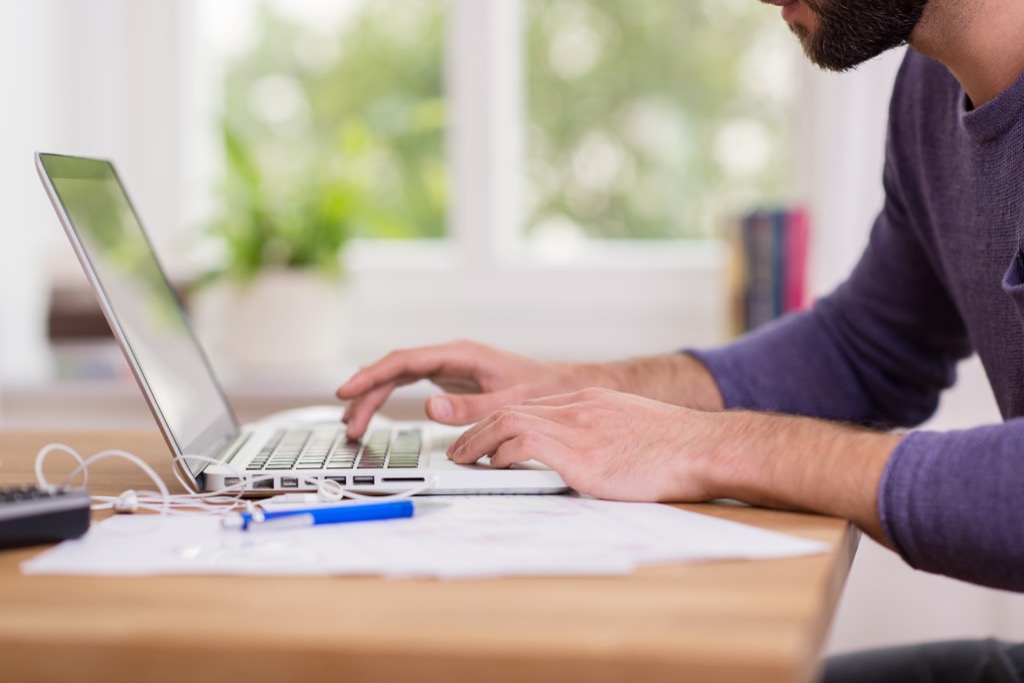Why Working from Home is the Holy Grail of Productivity Hacks

It’s every working professional’s dream to work from home—at least partially. You’ll have more peace and quiet, you’ll cut out your obnoxious commute, you’ll have any furry friends nearby, and you’ll quite possibly have better furniture. But there’s an even better reason to be working from home a few days a week: you’ll be way more productive.
If you’re working out an arrangement with your team, here are 10 reasons why you’d be a smarter and more effective person to squeeze in at least two work-from-home days a week—courtesy of leading industry professionals from killer companies like Evernote.
But one word of advice before you strike a deal with your company: always pick more “productive” days for working remotely (i.e.: Tuesday to Thursday). If you pick Monday or Friday as your at-home days, research shows that you’re politically hurting your chances of being promoted, as your boss may think you’re only angling for three-day weekends. If you target the mid-week, you’re letting him or her know that you’re serious about using your out-of-office hours for getting stuff done. And for more advice on how to be as productive as possible, here are smart ways to get ahead at work.
1
Cuts Out Excess Chit-Chat

The most obvious reason that working from home enhances productivity is all the office chatter that it removes. While a little coworker camaraderie is a valuable thing, both for your career advancement and mental health, the volume of daily chatter at the average office eats up far more time than is useful. “When we’re able to distance ourselves from distractions, we’re usually able to better manage our time and reach new heights of productivity,” says Josh Zerkel, director of global community and training at organizational app Evernote. “Everywhere we are, we’re in a battle for attention.”
Dillon Chen, director of curriculum at hiring software company ProSky, gives an example from his own previous job. “I was working in an office with a bunch of really great guys,” he says. “Someone always had a cool story to tell, or a funny video to share, or some topic to debate about. Though it was great office culture, it resulted in a lot of scrambling to catch up and hit deadlines. Working from home allows me to set the times so that I can socialize or work hard during the times that I want.” You can also reduce the mindless chit-chat by escaping the office gab master.
2
Kills Useless Meetings

Meetings may be an even greater productivity killer than casual office chatter. Unless being run with a strict eye on the agenda, they often veer into sidebar conversations and friendly catch-up sessions that have little to do with the work that actually needs to be done. Working from home makes clear the advantages of alternatives to in-person meetings.
“If the message can be clearly communicated in an email, it’s not necessary to have a meeting,” says Thomas Mitchell, a sales expert. “If someone wants to have a meeting with me, I often suggest a video call. Even better are voice memos. It’s more personal and less time-consuming than an email, but also doesn’t require the other person to be present in that exact moment, so you are able to communicate your thought or idea effectively and on your own time. You can also reference at anytime.” Now, you should also know some expert ways to crush your next business meeting for when you simply have to have one.
3
Makes Facetime Count

Of course, not all meetings are useless. There are times when getting together with colleagues or a few executives can be valuable—for example, when hashing out a way to reposition a product or discuss a reorganization of your team. But when some of the team is working from home, it increases the likelihood that when an organization calls a meeting, it will be for a goal that’s important enough to ask people to travel into the office.
The result is that the team will be more selective in which medium it selects for which activity.
“Each team will be unique, but you can decide on a preference order for communication channels; such as call if possible, then chat, then email,” says Evernote’s Zerkel. “Ultimately, determine as a team how you want to work together remotely. Get everyone aligned and set clear expectations that can be used moving forward. ”
David Niu, founder of employee survey platform TINYpulse, adds that certain types of discussions make sense in-person, while others are better over email or phone—and that working from home helps clarify the advantages/disadvantages of each medium.
“During the ideation phase of a project, it is far more productive to be working physically together to rapidly exchange ideas and read each others’ reactions to feedback,” says Niu. “During the execution phase, as long the expectations are clear, it can be more productive to work remotely to minimize interruptions and focus on the task at hand.”
4
Better Prepare for Afterwork Meetups

Often the most important in-person meetings take place outside the office—at a client dinner or drinks after work with a prospective partner, for example. But if you’ve been working in the office all day, unless you’ve got an on-site shower and change of clothes, chances are you’re going to look like you’ve been in the office all day. Working from home allows you get a shower, a fresh shave, and maybe even a nap before heading to an afterwork gathering. The people you are seeing will likely take note.
5
Cuts Out Commute Time

“The time saved from not having to travel to work and fight traffic can be better used preparing for the day, accomplishing tasks, and working on larger goals,” says Jen DeVore Richter, co-founder of marketing firm Rock My Image. “Empowering yourself or your employees to work from home provides a sense of freedom and enjoyment.”
Instead of having to tack on an hour commute to and from the office onto your workday, by working from home you can use that time to go to the gym, take care of errands, or get more of your work done. Multiply that by every day and you’re saving some serious dead time. Still, for those of you stuck with going in to the office, here are ways to make your morning commute the most productive part of your day.
6
Create a Workspace Geared Toward Accomplishing Goals

You can tailor your home office to fit your needs. If you like to work while standing on your treadmill, or want a desk that fits snuggly into the corner, or connect your computer to your flatscreen TV and work on a monitor the size of a wall, you are free to do so. Whatever makes you work more effectively, you can do without having to worry about weird looks from colleagues. One thing to keep in mind though: when working from home, be sure your workspace is clearly defined.
“You can consider your physical workspace: Is it really a workspace?” says Maura Thomas, founder of RegainYourTime.com and author of Work Without Walls: An Executive’s Guide to Attention Management, Productivity, and the Future of Work. “Do you have an appropriate amount of space for the tools of your work, such as ample room to comfortably hold your computer and peripherals, some space to write and do work that isn’t computer-based, plus storage space for other tools and accessories, like pens, stapler, paper clips, phone, calculator, reference material, unopened mail, glass of water, outlets and USB ports, etc.?”
7
You Won’t Freeze to Death

Just as working from home allows you to make your workspace fit your needs, you can do the same with your environment. “You are also happier working from home, generally, for the simple fact that you’re in your own space and your own controlled environment,” says Nick Hennen, senior media relations manager for mobile tools company Cheetah Mobile. “You don’t have to worry or consider others with things like room temperature, ambient noise, etc.”
For Mitchell, temperature was a major thing to consider.
“Our office temperature is a bit on the high side, in my opinion,” he says. “The warm temperature slowed me down and ended up making me feel tired. This was a subconscious distraction that I didn’t even realize was affecting me until I found myself at home able to control my A/C to my personal preference. When the environment is cooler, my mind is sharper.”
8
Wear What Works For You

Being able to control your environment extends to what you wear to the office. Working from home allows you to skip the suit and tie and wear whatever lets you do your work better, whether that’s t-shirt and jeans, workout clothes, or nothing at all (though don’t forget to look work-appropriate for any video chats). But if you do need to go into the office, make sure you’re up-to-date on the new rules of office style.
9
Lets You Decide Your Own Productive Hours

“Studies have proven that people have different times of the day that are the most productive to them,” says ProSky’s Chen (maybe you’re even a man who likes working on the weekend). “For me, it’s a couple of hours in the morning, and then early evening to about midnight. Having the freedom to decide my schedule allows for me to take care of distractions such as housework and various errands so that when I do sit down to work, I am completely focused on the task at hand.”
Being able to work during one’s productive hours lets you get your tasks done in far less time and to a better quality than when you’re stuck in an office waiting for the day to end.
10
Take Breaks When You Like

“I’m actually far more productive with regular five- to 10-minute breaks every couple of hours and find that is too difficult when in the office because of distractions from other,” says Cheetah Mobile’s Hennen. “You also don’t have to worry about when to take a break and how you’ll be perceived in any way taking that break or having a bite to eat or whatever.”
Christina Nicholson, a former TV reporter and anchor as well as an entrepreneur coach who runs Media Maven, is an advocate of taking periodic breaks, when they work best for you.
“I welcome a distraction as a reason to take a break,” she says. “We are people, not machines. Therefore, we should not work eight hours straight because that’s not productive. Your brain needs a break. I take breaks to do the laundry, unload the dishwasher, go to the grocery store, etc.”
For more amazing advice for living smarter, looking better, and feeling younger, follow us on Facebook now!